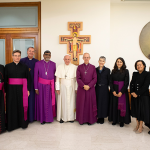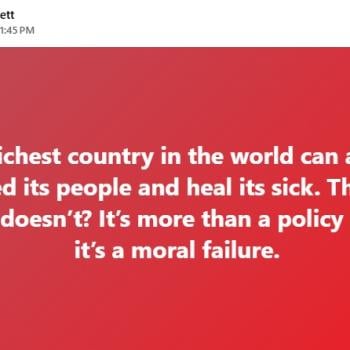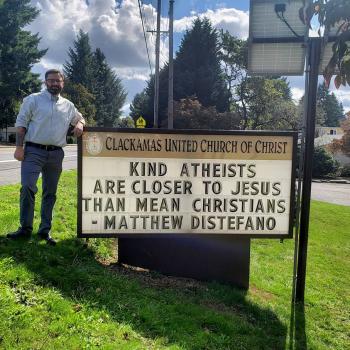Part of my family’s faith journey was in the Anglican Church of Nigeria from 2012-2016. After an abrupt church split, we left in 2016, well before any of our children came out LGBTQ+. As a mother who loves and tried to protect her children, I didn’t understand the oppression and dangers LGBTQ+ people were facing in Africa and just how dangerously anti-LGBTQ+ parts of Africa can be. I cannot express how thankful I am that we were not in that church environment when our children did finally come out LGBTQ+ in their 20s (which is a little late) because this easily could have lead to a tragic death or two in my family. After learning what I now know today, I try to assist those LGBTQ+ young adults in Africa from the United States escaping marginalization and danger. I have only recently come to understand just how much many (not all) conservative worldwide faith leaders, many (not all) conservative politicians, and many (not all) conservative African faith leaders lie about and misrepresent LGBTQ+ people and their families. Adding their misrepresentation to the collective of anti-LGBTQ+ leaders worldwide who have codified their misrepresentations into civil law, we have a real problem and added significant dangers to LGBTQ+ people and their families. Of two silenced group of LGBTQ+ refugees I know and speak with in East Africa, one of them said I could mention them by name, Calvin Phil. Calvin writes, “Coming out as LGBTQ+ in Africa is incredibly difficult and risky. It’s not just about facing rejection. Many live in constant fear of violence, imprisonment, or even death, simply for being who they are. The courage it takes to come out in such an environment is unimaginable.”
Four years ago, I discovered something I did not know— many conservative religious families have been forced to leave their faith communities because their children came out as LGBTQ+. Through starting my LGBTQ+ parent work in 2021 with LGBTQ+ organizations, I have met many families who left their churches because they had to choose between upholding their LGBTQ child’s right-to-life or remaining in their faith community, their home state, or even their country. I now recommend that religious families start in fully-affirming religious traditions of their choice instead of escaping trauma and danger later if their children come out LGBTQ+ or are diagnosed with any mental health condition or neurodevelopmental disability.
I am an Educational Therapist and a religious parent (much more progressive now) of multiple neurodivergent and LGBTQ+ young adult children. As a professional, I define “neurodiverse” as describing anyone who falls on a behavioral spectrum that doesn’t fit the majority of the general population. For example, approximately one percent of the world population falls on the autism spectrum.
There is an overlap between the disability world and the LGBTQ+ community. The gender expansive experience (transgender, non binary, gender fluid, etc….), for example, is anywhere from three to nine times more prevalent in families with neurodiverse or autistic children, such as in my family. According to The Trevor Project, “the prevalence of autism among individuals with gender dysphoria is estimated as somewhere between six and 25 percent.
The consensus in the medical community is that the suicide rate for LBGTQ youth is notably higher in certain conservative religious communities than it is in more affirming religious or secular environments. I now understand this truth after working with these families escaping religious trauma and living the LBGTQ+ experience as a parent.
In my work, I have seen some of these families ripped apart by tragedy. LGBTQ teens, young adults (and even their parents) are taking their own lives by suicide after being shamed by others and forced to leave their faith communities. In some cases, they feel forced to leave their home state or country.
I have worked with neurodiverse children in the disability community for many years. Because of that work, just as I understand that there are variances in neurology, psychology and biology in a certain percentage of the population, I now understand that there are variances in gender and sexuality for certain people.
The LGBTQ identity spectrum is not a disability spectrum, but rather a true spectrum of psychology; it is not a “gay agenda” or a “personal choice, ” as some people claim despite professional medical consensus. According to a 2019 study, when one parent fully supports their LGBTQ child, the rate of suicide attempts drop dramatically, by over 40 percent. Any efforts to coerce or change an LBGTQ child’s identity, such as through gay “conversion,” “reparative therapy” or even threats of eternal damnation, cause, the statistics show, lasting psychological damage.
Fully accepting the LBGTQ identity of children can be difficult for some religious parents, professionals and ministers, in particular, because they many times have to reconcile certain faith issues while unconditionally loving and supporting LBGTQ youth and adults. The lives and health of LGBTQ people depend on at least one adult or parent fully affirming and supporting them along with other professionals and ministers. This is much more a matter of the sanctity of life, the dignity of the human person, and unconditional love above any and all doctrinal struggles related to sexual activity or apparel choices which is a much smaller part to not a part of the LGBTQ+ identity. The Hogg Foundation for Mental Health states that every word and action of love, affirmation or acceptance can be the difference life and death for LGBTQ people.
When we look at the consequences of rejecting the neurodiverse and LBGTQ children, we find depression, anxiety, self-hatred, shame, self-harm, substance abuse, separation from God and the church, and a heightened risk of suicide.
But when we teach that God and the church accept these people unconditionally, LGBTQ and neurodiverse people can find peace, joy, wholeness, love, better health, better family relationships, and life.
LGBTQ youth need unconditional love and support, especially from other religious faith leaders. Love and support from other Christians is seen as love and acceptance from God, while Christians rejecting, trying to change or coerce LGBTQ+ people is seen as rejection and abuse from God. For the Christian, Jesus taught us to defend all those who were in any way marginalized, not further oppress them.
If we claim to act in Christ’s name or act in the name or any loving faith, we need to follow the command to love our neighbor as ourselves. This would mean loving and fully accepting LGBTQ+ young people unconditionally, including using their preferred pronouns. These affirmations help reduce the suicide statistics dramatically.
Overall, the church and society globally must move to reconcile with the LGBTQ+ community and provide safe and affirming inclusive spaces and pastoral ministry which aligns with current science. Anything else will continue to endanger and disrupt the lives of LGBTQ+ people and their families.













